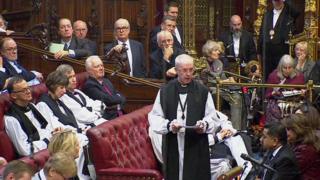 Image copyright
Image copyright
House of Lords
Justin Welby said another referendum was not the way to “heal” the country’s divisions
Holding a second EU referendum would deepen divisions over Brexit, the Archbishop of Canterbury has warned.
Speaking in the House of Lords, the Most Reverend Justin Welby said a “national reconciliation” was needed.
Peers, who are scrutinising Theresa May’s Brexit bill, rejected calls for another poll by 336 votes to 131.
But the government faces a possible defeat later over calls for Parliament to be given a “meaningful vote” on the final deal negotiated by ministers.
- Live: Lords debate Brexit bill
- Hague: Early poll to boost Brexit hand
- Brexit: All you need to know
- Goodbye Britain – EU ponders the future
Defending his party’s call for a second referendum, Lib Dem Lords leader Lord Newby said his party was not “sidelining Parliament” with its bid to amend the draft legislation.
But he said not offering people the chance to vote on the UK’s exit terms would create “widespread and justified anger which would be corrosive to our national life in many years to come”.
Without a commitment to a second vote, the Lib Dems say they will vote against the EU (Notification of Withdrawal) Bill, which will give the government the power to trigger Article 50 and begin official Brexit talks, at third reading later on Tuesday.
The archbishop said he understood the “good intentions” behind the Lib Dem amendment, but said: “Holding another referendum will add to our divisions.”
Divisions are not something to be “navigated around” but need to be “healed”, he said, adding: “This feels like the most divided country I have lived in in my lifetime.”
‘Meaningful’ vote
Later, the Lords is expected to inflict a second defeat on the Brexit bill over whether MPs will get a “meaningful vote” once negotiations have been completed.
Peers have already voted in favour of guaranteeing the rights of EU residents to remain, putting them on a collision course with MPs, who rejected the idea.
However, MPs will have the chance to reverse any changes when the bill returns to the House of Commons next week
No 10 has assured Parliament it will get a say on the outcome of the two year Brexit talks, but opponents want to be able to vote to reject any deal done and ask Mrs May to go back and get a better one.
MPs voted by a margin of 326 to 293 against giving Parliament a potentially decisive say over the final deal after ministers agreed that MPs would get a chance to vote on the final deal.
But a Labour amendment tabled in the House of Lords, backed by leading crossbench peers, would require the explicit approval of Parliament before Mrs May could conclude any deal on leaving the EU or establishing a new relationship.
Image copyright
Getty Images
The prime minister wants to begin formal talks by the end of the month
The amendment has the backing of leading QC Lord Pannick, former diplomat Lord Hannay and Conservative peer Viscount Hailsham.
Ministers have previously indicated that were MPs or peers to reject a deal agreed with the other 27 states or if no acceptable deal could be reached, the UK would still leave, potentially defaulting to World Trade Organisation rules on commerce.
Critics say this would be highly damaging economically and Parliament must have the authority to send ministers back to the negotiating table to secure new terms.
Should the Lords amend the bill, the matter would pass back to the House of Commons, which would be expected to reject it again – potentially leading to a stand-off between the elected and unelected chambers.
The Liberal Democrats, who want a second referendum on the terms of the Brexit deal, have a far stronger presence in the House of Lords – with 102 peers – than in the Commons, where they have just nine MPs.
Party leader Tim Farron acknowledged there was a “great irony” in the Lib Dems, who want to abolish the House of Lords, making use of their peers, but said: “You use the system that’s in front of you.”
But speaking during the Lords debate, UKIP’s Lord Pearson said that if the Lib Dems used their numerical advantage “to vote down the will of the British people… they will reveal their contempt for democracy”.
‘Common sense’
On Monday, former Chancellor Lord Lamont warned that many of those seeking a meaningful vote actually wanted to stop Brexit in its tracks.
“Amendments should not be used as a cover by those who are seeking to oppose the results of the referendum,” he said in a speech in London. “I hope my colleagues in the Lords will see sense.”
Meanwhile, the prime minister has been warned not to use her proposed Great Repeal Bill to avoid full parliamentary scrutiny of the Brexit process.
The Great Repeal Bill will scrap the 1972 European Communities Act, which paved the way for the UK to enter the then-EEC, ending the legal authority of EU law.
It will also transpose EU regulations into domestic law, crucially allowing them to be altered or removed after Brexit.
Senior peers on the House of Lords Constitution Committee said Mrs May must not use the legislation to “pick and choose” which elements of European law she wanted to scrap or alter without Parliament’s full involvement.
Justin Welby: Second EU referendum would deepen Brexit divisions}

